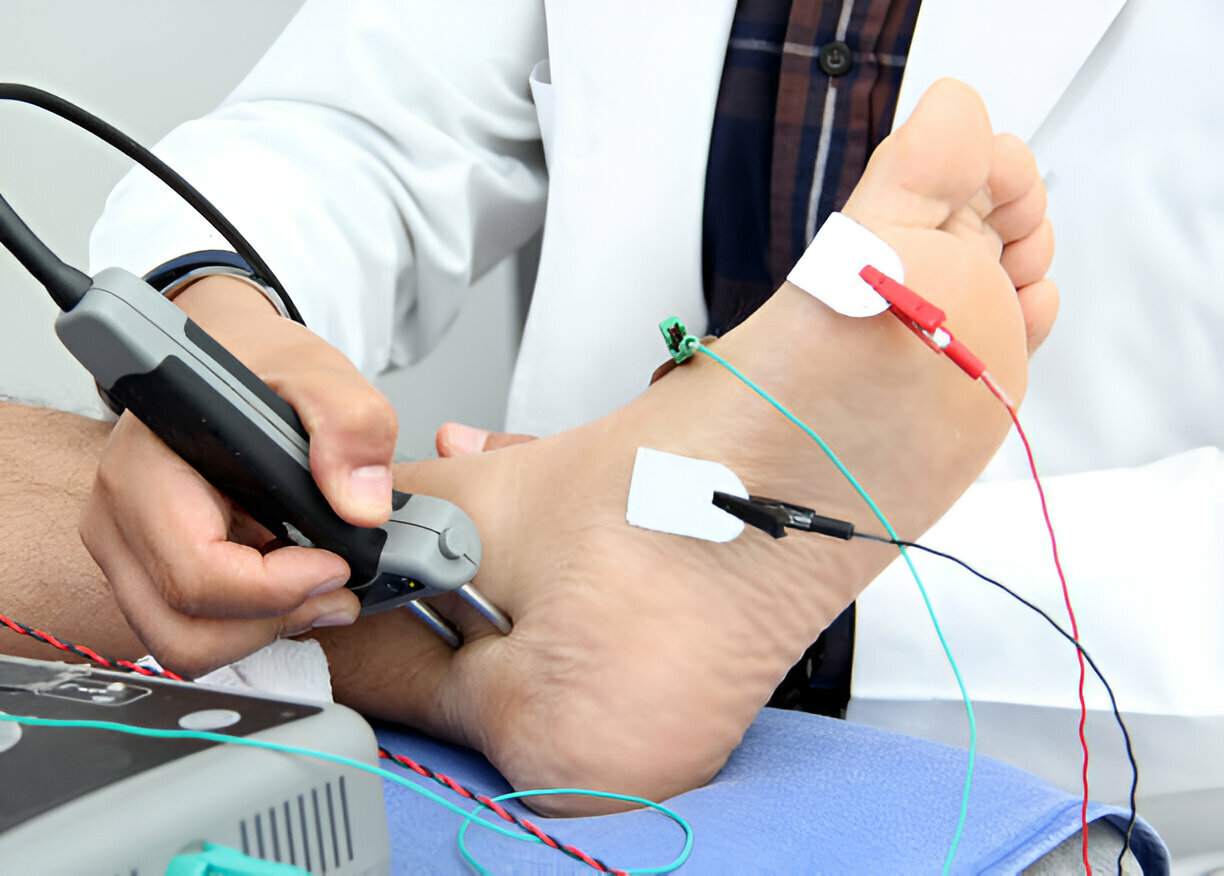

Foot pain can greatly impact your daily life, making simple activities like walking uncomfortable and restricting mobility. While some discomfort may be short-term, ongoing pain could indicate underlying issues that need professional attention. In this article, we'll explore the common causes of foot pain, when to seek professional help, and the role of a foot care clinic in diagnosing and treating your symptoms.
Foot pain can arise from various factors, including structural issues and lifestyle choices. Some common causes are:
Bunions and Hammertoes: Bunions are painful bony bumps that form at the base of the big toe, while hammertoes cause toes to bend, leading to discomfort and difficulty finding appropriate shoes.
Flat Feet or High Arches: Both conditions can cause improper weight distribution across the foot, leading to pain when walking or standing for extended periods.
Tendinitis: Tendon inflammation, such as Achilles tendinitis, can cause pain at the back of the heel and is often linked to overuse or improper footwear.
Recognizing these symptoms can help you understand the source of your discomfort. If you're experiencing persistent pain, it may be time to consult a foot care clinic.
Not all foot pain requires a visit to a clinic, but certain signs indicate that professional care is necessary:
Swelling and Redness: Swelling, redness, or warmth may be signs of an infection or inflammatory condition, which requires immediate medical attention.
Difficulty Walking: Struggling to walk or bear weight on your foot can suggest structural issues or severe inflammation that needs professional treatment.
Changes in Shape: Deformities like bunions or hammertoes should be assessed early to prevent long-term complications.
Numbness or Tingling: Loss of sensation or abnormal feelings in the feet can indicate nerve problems that require further investigation.
If you experience any of these symptoms, it's important to visit a clinic for a diagnosis and a personalized treatment plan.
They specialize in diagnosing and treating a wide range of conditions. Here's what you can expect during your visit:
Advanced Diagnostic Techniques: Many clinics use tools like X-rays, ultrasound imaging, or 3D scanning to get a detailed look at your condition and ensure accurate diagnosis.
Personalized Treatment Plans: Based on your assessment, the specialist will create a treatment plan that may include orthotics, physical therapy, or medication. If necessary, they may refer you to a podiatrist for further care.
Prevention and Education: Clinics emphasize teaching patients how to prevent future problems through proper footwear, stretching exercises, and lifestyle modifications.
When you visit a foot care clinic, you'll have access to various treatment options tailored to your specific condition:
Custom Orthotics: These specially designed shoe inserts provide support and improve alignment to alleviate pain.
Physical Therapy: A physical therapist can create an exercise program to strengthen the muscles in your feet and improve flexibility.
Medication: Anti-inflammatory medications or corticosteroid injections may be used to manage pain and reduce inflammation.
Surgery: In severe cases, surgery may be required to address structural deformities or significant injuries.
Education: These clinics also provide education on maintaining foot health and preventing future issues, including advice on footwear and daily care routines.
Prevention is often more effective than treatment. Here are some tips to help maintain healthy feet:
Choose Proper Footwear: Invest in shoes that provide good support and fit well. Avoid wearing high heels or shoes that pinch your toes.
Practice Good Hygiene: Keep your feet clean and dry to avoid infections. Regularly check for changes like blisters, calluses, or discoloration.
Stay Active: Regular physical activity helps maintain a healthy weight and strengthens the muscles in your feet.
Stretch and Strengthen: Regularly stretch and exercise your feet and ankles to improve flexibility and prevent injuries.
Be Mindful of Activities: Ensure you warm up properly before exercise and wear the right footwear to prevent injuries.
By following these preventive measures, you can minimize the risk of pain and maintain the health of your feet.
Routine visits to a foot care clinic can significantly improve your overall health by:
Improved Mobility: Addressing pain allows you to move comfortably, leading to a more active and healthier lifestyle.
Holistic Health Management: Foot problems can be linked to other health conditions, such as diabetes or arthritis. Regular visits help manage these connections effectively.
Personalized Care: A clinic will provide a plan tailored to your unique needs, leading to better outcomes and satisfaction.
Education: Ongoing visits ensure you stay informed about foot health, empowering you to take proactive steps for long-term wellness.
When selecting a clinic, consider the following factors:
Range of Services: Choose the one that offers a comprehensive range of services, including diagnostic testing, treatment options, and rehabilitation.
Patient Reviews: Check online reviews or ask for recommendations to gauge patient satisfaction and care quality.
Convenience: Choose one that is convenient in terms of location and operating hours.
Insurance: Verify that it accepts your insurance or offers flexible payment plans.
By taking the time to do your research, you can ensure you receive the best possible care for your foot health.
Foot pain shouldn't limit your mobility or quality of life. Understanding the causes, knowing when to seek professional help, and utilizing the services of a foot care clinic are crucial steps toward achieving pain-free walking. If you're experiencing pain, don't wait. Visit a clinic to receive expert care and regain your comfort.
Take the First Step Toward Pain-Free Walking
Ready to walk pain-free? Contact our foot clinic in Calgary today to schedule your appointment and start your journey toward healthier feet and improved mobility!

Fungal toenails, also known as onychomycosis, is a common condition that impacts the appearance and health of your toenails. This infection is caused by various fungi that thrive in warm, moist environments, often found in public places like showers, pools, and locker rooms. When these fungi take hold, they can cause your toenails to become discoloured, thick, and brittle, making them unsightly and potentially painful.
It can be a persistent and stubborn issue, and attempting to treat it yourself may not yield the best results. This is where a podiatrist, a medical expert specializing in the diagnosis and treatment of foot and ankle conditions, can make an immense difference.
Weak immune system: Individuals with compromised immune systems, such as those with diabetes, HIV, or certain medications, are more susceptible to fungal infections.
Poor circulation: Reduced blood flow to the feet can make it harder for the body to fight infections.
Repeated exposure: Frequent exposure to public areas with warm, moist environments, such as communal showers or swimming pools, increases the risk of contracting an infection.
Injury to the nail: Trauma or damage to the toenail can create an entry point for fungal organisms.
Genetics: Some people may be more predisposed to developing fungal toenails due to their genetic makeup.
Although over-the-counter antifungal treatments may provide temporary relief, they often don't eliminate the fungus, leading to recurring infections. However, consulting a podiatrist provides a more comprehensive and effective approach to treating fungal toenails.
Podiatrists have specialized training and expertise in diagnosing and treating foot and ankle conditions. They can accurately identify the type of fungus causing the infection and recommend the most appropriate treatment plan to address the root cause of the problem.
Accurate Diagnosis: A podiatrist can perform a thorough examination and, if necessary, conduct tests to determine the specific type of fungus causing the infection, ensuring the most effective treatment plan.
Personalized Treatment: Podiatrists can customize the treatment to suit your individual needs, considering factors such as the severity of the infection, your overall health, and any underlying conditions contributing to the issue.
Faster Recovery: With the right treatment approach, you can expect faster and longer-lasting results in clearing up the infection, reducing the risk of recurrence.
Improved Appearance: Successful treatment can help restore the appearance of your toenails, improving their overall health and appearance.
Pain Relief: In some cases, the infection can cause discomfort or pain. Proper treatment can help relieve these symptoms and improve overall quality of life.
Medical History: The podiatrist will ask about your medical history, underlying conditions, and medications or treatments you may have tried previously.
Physical Examination: The podiatrist will thoroughly examine your feet and toenails, looking for signs of infection and assessing the severity of the condition.
Diagnostic Tests: If necessary, the podiatrist may perform additional tests, such as a fungal culture or a biopsy, to confirm the diagnosis and identify the specific type of fungus.
Treatment Plan: Based on the findings, the podiatrist will develop a personalized treatment plan that may include topical or oral antifungal medications, laser therapy, or other specialized treatments.
Follow-up Care: The podiatrist will provide guidance on how to care for your feet during the treatment process and schedule follow-up appointments to monitor your progress and ensure the infection is fully resolved.
Topical Medications: These are applied directly to the affected toenail and can help gradually clear the infection.
Oral Medications: Taken in pill form, these medications work systemically to target the fungus and clear the infection from the inside.
Laser Therapy: Advanced laser treatments can effectively eliminate the fungus by targeting it with concentrated light energy.
Surgical Removal: In severe cases, the podiatrist may recommend removing the affected toenail to allow for a new, healthy nail to grow in its place.
The specific treatment plan recommended by your podiatrist will depend on the severity of your condition, your overall health, and your response to the various treatment options.
Practice Good Foot Hygiene: Keep your feet clean and dry, especially between the toes, to discourage the growth of fungi.
Wear Protective Footwear: Wear shoes or sandals in public areas like locker rooms, pools, and showers to minimize exposure to fungal organisms.
Maintain Proper Nail Trimming: Carefully trim your toenails straight and avoid cutting them too short, as this can create an entry point for fungi.
Disinfect Nail Clippers: Thoroughly clean and disinfect your nail clippers after each use to prevent the spread of fungal infections.
Monitor for Early Signs: Be vigilant for any changes in the appearance of your toenails, such as discoloration or thickening, and seek prompt treatment if you suspect a fungal infection.
In conclusion, seeking professional treatment from a podiatrist is the most effective way to address fungal toenail infections. By taking advantage of the specialized expertise and advanced treatment options, you can expect faster, more reliable results and a lasting solution to this common foot health issue. Don't let this condition hold you back – take control of your foot health and schedule a consultation at a reputable podiatry clinic near you today.
If you're struggling with unsightly and uncomfortable fungal toenails, don't hesitate to schedule an appointment with us. We can provide the specialized care and personalized treatment plan you need to get your feet back to their healthy, happy state. Take the first step towards clear, beautiful toenails by contacting us today.

Your feet are the foundation of your body, carrying you through life's daily activities. However, when foot problems arise, they can significantly impact your overall well-being and quality of life. From bunions to plantar fasciitis, many individuals struggle with various issues that can cause pain, discomfort, and even mobility challenges.
Recognizing the importance of addressing these problems is the first step towards achieving long-term foot health. By understanding the underlying causes and seeking professional help, you can take proactive measures to alleviate your woes and enjoy a pain-free future.
When it comes to foot problems, attempting to self-diagnose and treat the issue can often lead to further complications. While some minor ailments may be manageable with simple home remedies, more complex or persistent problems require the expertise of a qualified healthcare professional – a podiatrist.
A podiatrist is a medical specialist who focuses on diagnosing, treating, and preventing foot and ankle-related conditions. These highly trained professionals possess the knowledge and skills to identify the root causes of your problems and develop customized treatment plans to address them effectively.
In Calgary, there is access to a wide range of podiatric services designed to cater to your specific foot health needs. From comprehensive examinations and advanced diagnostic techniques to the latest treatment options, a skilled podiatrist in Calgary can provide you with the personalized care you deserve.
One of the primary culprits behind many foot problems is ill-fitting or inappropriate footwear. Shoes that are too tight, too loose, or lack adequate support can lead to a variety of issues, including:
When you visit a foot doctor, they will conduct a thorough examination to identify the underlying cause of your problems. This may involve a combination of physical assessments, imaging tests, and gait analysis. Based on their findings, they will create a tailored treatment plan designed to address your unique concerns effectively.
Depending on the nature of your condition, the podiatrist's recommendations may include:
By working closely with a foot doctor, you can find relief from your pain and regain your active lifestyle.
Just as you visit your primary care physician for routine check-ups, scheduling regular appointments with a podiatrist is equally important. These visits allow the healthcare professional to monitor the health of your feet, identify any emerging issues, and implement preventive measures to maintain your foot’s well-being.
Choosing a reputable podiatrist in Calgary can provide you with a range of benefits, including:
In addition to seeking professional help from a foot doctor, there are several proactive steps you can take to maintain the health of your feet:
By incorporating these preventive measures into your daily routine, you can significantly reduce your risk of developing problems and enjoy a pain-free, active lifestyle.
Your feet are the foundation of your body, and taking care of them should be a top priority. By understanding the role of a podiatrist and the common foot problems caused by improper footwear, you can take proactive steps to address any issues and maintain your foot health.
Don't let foot pain hold you back. Schedule an appointment with us today and take the first step towards a pain-free future.

Your feet are the foundation of your body, supporting your weight and enabling your mobility. However, many people often neglect their foot health, leading to a range of problems that can impact their overall well-being. This is where the expertise of a podiatrist becomes invaluable.
Podiatry is a specialized field of healthcare that focuses on the diagnosis, treatment, and prevention of foot, ankle, and lower limb conditions. Podiatrists are highly trained medical professionals who have extensive knowledge of the complex structure and function of the feet and lower extremities.
Maintaining optimal foot health is crucial for your overall well-being, and regular visits to a foot doctor can play a vital role in this process. Here are some of the key reasons why you should consider scheduling regular appointments with a podiatrist:
1. Early Detection and Prevention: Regular check-ups can help identify potential foot problems at an early stage, allowing for timely intervention and prevention of more serious issues.
2. Manage Chronic Conditions: If you have a chronic condition, such as diabetes or arthritis, regular visits to a foot clinic can help you manage the impact of these conditions on your feet and lower limbs.
3. Improve Mobility and Quality of Life: By addressing foot problems and promoting optimal foot health, a foot doctor can help improve your mobility, reduce pain and discomfort, and enhance your overall quality of life.
4. Specialized Care: Podiatrists have specialized training and expertise in diagnosing and treating a wide range of foot and ankle conditions, ensuring you receive the most appropriate and effective care.
5. Customized Treatment Plans: A podiatrist works with you to develop a personalized treatment plan that addresses your specific needs and goals, taking into account your lifestyle, medical history, and personal preferences.
Podiatrists are equipped to handle a wide range of foot problems, including:
1. Bunions: A bunion is a bony protrusion at the base of the big toe that can cause pain, inflammation, and difficulty wearing shoes. A foot doctor can provide conservative treatment options, such as custom orthotics or splints, or recommend surgical intervention if necessary.
2. Ingrown Toenails: Ingrown toenails can be painful and lead to infection if left untreated. A podiatrist can safely remove the ingrown portion of the nail and provide guidance on proper nail care to prevent recurrence.
3. Plantar Fasciitis: Plantar fasciitis is a common cause of heel pain, often caused by overuse or excessive strain on the plantar fascia. A podiatrist can develop a treatment plan that may include stretching exercises, custom orthotics, and in some cases, corticosteroid injections.
4. Diabetic Foot Care: Individuals with diabetes are at a higher risk of developing foot-related complications, such as neuropathy, ulcers, and infections. A podiatrist can provide comprehensive diabetic foot care, including regular check-ups, wound management, and preventive measures.
5. Sports-Related Injuries: Athletes and active individuals are susceptible to a variety of foot and ankle injuries, such as sprains, fractures, and tendinitis. A podiatrist can diagnose the problem, recommend appropriate treatment, and provide guidance on rehabilitation and injury prevention.
Addressing foot problems early on can have a significant impact on your overall health and well-being. By seeking the expertise of a foot doctor, you can take proactive steps to prevent the development or progression of various foot conditions. Early intervention can:
● Reduce the risk of more serious or chronic issues
● Alleviate pain and discomfort
● Improve mobility and quality of life
● Prevent the need for more invasive or costly treatments
● Promote long-term foot health and overall wellness
When you visit a foot clinic, you can expect a comprehensive evaluation and personalized care. During your appointment, the podiatrist will:
1. Conduct a thorough examination: They will examine your feet, ankles, and lower limbs, checking for any signs of problems or abnormalities.
2. Review your medical history: They will ask about your medical history, any current symptoms, and any previous foot or ankle issues you may have experienced.
3. Perform diagnostic tests: Depending on your condition, they may order X-rays, MRI scans, or other diagnostic tests to help identify the underlying cause of your foot problem.
4. Develop a treatment plan: Based on the findings of the examination and diagnostic tests, they will work with you to develop a personalized treatment plan, which may include conservative treatments, such as orthotics or physical therapy, or more advanced interventions, like surgery.
5. Provide ongoing care and monitoring: They will schedule follow-up appointments to monitor your progress, adjust the treatment plan as needed, and ensure the long-term health of your feet and lower limbs.
In addition to regular visits to a podiatrist, there are several steps you can take to maintain optimal foot health:
1. Wear Proper Footwear: Invest in well-fitting, supportive shoes that provide adequate cushioning and arch support.
2. Practice Good Foot Hygiene: Wash your feet daily, keep them clean and dry, and trim your toenails regularly.
3. Maintain a Healthy Weight: Excess weight can put additional strain on your feet and increase the risk of foot-related problems.
4. Engage in Regular Exercise: Incorporate low-impact activities, such as walking, swimming, or cycling, to strengthen your feet and lower limbs.
5. Monitor for Changes: Be vigilant for any changes in the appearance or sensation of your feet, and seek prompt medical attention if you notice any issues.
Your feet are the foundation of your body, and maintaining their health is crucial for your overall well-being. By incorporating regular visits to a podiatrist into your healthcare routine, you can take proactive steps to prevent and address a wide range of foot problems, ensuring optimal foot health and enhancing your quality of life.
Don't wait until it's too late - schedule your appointment with trusted podiatrists in Calgary today @ Achilles Foot Clinic and take the first step towards a healthier, more active future. Your feet deserve the best care, so why not give them the attention they need?